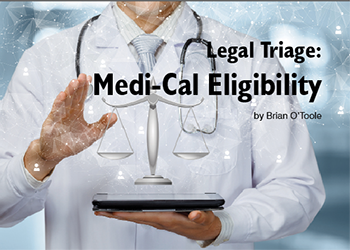
Legal Triage: Medi-Cal Eligibility
A well-crafted estate plan is a work of art: Carefully constructed documents addressing complex legal issues ranging from fraught family dynamics to sophisticated tax avoidance strategies that create a family legacy.
Then life happens. Or rather, death tries to happen, but the miracle of modern medicine extends life at the price of severe mental and/or physical incapacity. Most typically, a loved one requires a skilled nursing facility with the expectation that returning home is neither medically nor financially possible.
Skilled nursing costs anywhere from $300 – $1,000/day, a financially unsustainable undertaking for most. Many turn to Medi-Cal benefits to help pay for skilled nursing care.
If you are the attorney that put together the estate plan for a recently incapacitated client, the family often turns to you to guide them through the crisis. The following summarizes some issues arising during the panicked phone call from the family[1]:
1. What estate planning tools do you have to work with?
For purposes of accelerating Medi-Cal eligibility, Elder Law attorneys often provide flexibility for the agent acting under a Durable Power of Attorney to amend the trust and to make gifts of the principal’s assets.
A Living Trust and Power of Attorney for Finances are staples in any estate plan, and they are particularly important when you are attempting to “accelerate financial eligibility” for Medi-Cal benefits. Not every Trust or Power of Attorney allows the necessary flexibility, and amendments might be required. Probate Code §§ 15401 & 4264 require mirroring language in the Trust and Power of Attorney to enable a non-Settlor Trustee to amend or revoke a trust. Section 4264 also requires express language to enable the agent to make gifts of the principal’s assets.
2. Medicare Coverage of Skilled Nursing Care
Medicare will only provide coverage so long as the patient is rehabilitating, or so long as skilled nursing care is required for the patient to maintain their health status. Jimmo v. Sebelius [No. 5:11-CV17 (D. Vt)], Medicare will cover up to 100 days of skilled nursing care. Days 1-20 are covered in full, and a copayment exists for days 21-100. Supplemental Medicare insurance often covers the entire copayment.
Medicare’s skilled nursing care benefits require that the patient be admitted (NOT held in observational status) into an acute care hospital for three days, not including the day of discharge. Without the necessary hospital stay, the Medicare benefit for skilled nursing care is unavailable.
3. Financial Eligibility for Medi-Cal
Medi-Cal covers long-term skilled nursing care, but only if you qualify. Medi-Cal updates financial eligibility rules each year via “All County Welfare Director Letters” that can be found via a web search. For 2021, a married couple may utilize a “Community Spouse Resource Allowance” of $130,380.00 (See ACWDL 20-27) – an amount of countable assets that the “well-spouse” may keep and still allow the institutionalized spouse to qualify for Medi-Cal benefits. If the client is single or widowed, then the amount of countable assets for Medi-Cal eligibility is limited to $2,000.00. Retirement accounts, such as IRAs and 401(k)s, are exempt if distributions are being made from them.
A residence does not impact Medi-Cal qualification if the applicant has an “intent to return home.” “Intent to return home” is a subjective standard. It does not have to be objectively likely to occur.
4. Gifting
People often need to “spend down” assets to qualify for Medi-Cal through a calculated gifting plan. California’s generous Medi-Cal gifting rules are currently determined by dividing the gift amount by the Average Private Pay Rate (APPR), currently $10,298.00 (See ACWDL 20-11). Medi-Cal uses Form MC 176 PI to determine gifting penalties. The MC 176 PI does not cumulatively add gift transfers together to determine qualification unless they are made to the same person, from the same account, on the same day. Furthermore, gift penalties run concurrently, not consecutively. The end result is that many clients may employ a strategic gifting strategy (“stacked gifting”) of daily gifts of under $10,298 per recipient, greatly accelerating their ability to get “just poor enough” to qualify for Medi-Cal benefits. Don’t do this kind of gifting without consulting with a Medi-Cal planner – to confirm that the transfers are done correctly and ethically.
5. Medi-Cal Recovery
Medi-Cal “recovery” rules changed drastically in 2017 to the great benefit of Medi-Cal recipients and their beneficiaries. Now Medi-Cal will only attempt to recoup payments incurred on behalf of a decedent when the estate is required to go through a formal probate. Since 2017, creating a normal living trust, and funding it properly, is a perfectly acceptable method to avoid Medi-Cal recovery. Those who own a home, an exempt asset for purposes of Medi-Cal eligibility, only need to put the house in a trust to protect it.
Bottom line, there is no need to gift the home to other family members out of fear of a Medi-Cal Recovery – best for the Medi-Cal recipient to hold the home in trust, then pass the home to beneficiaries on death, thereby receiving a stepped-up cost-basis… a win-win for everyone.
What if I die? What if I live?
Often, people first engage in estate planning in order to address the “what if I die” questions. But the “what if I live” questions are the ones that Elder Law attorneys must be ready to address.
Ensuring that estate planning documentation is designed to address the medical and financial challenges that come with getting older is the first step to ensure that the right tools are available.
[1]Additional resources: CANHR.org and CEB’s Elder Law practice guides are exceptional resources for any aspiring, or established, Elder Law attorney. CCR, Title 22, Div 3 provides the regulatory framework for Medi-Cal eligibility, share of cost, and recovery. Draft regulations governing Medi-Cal gifting are found in ACWDL 90-01 and 90-03, which are purchased from CANHR.